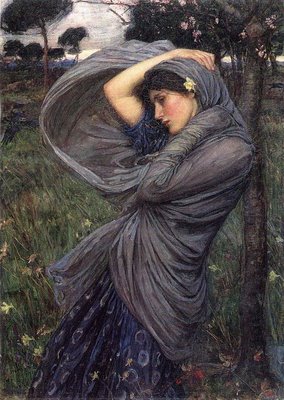I have to be honest, when JPII begins explaining the "sexual urge," I find it a bit difficult to understand. I hope that as I progress in reading Love & Responsibility that the issue of the sexual urge becomes lucid.
Okay. JPII describes the "sexual urge" as a drive common to all human beings. True. True. This urge or instinct is not merely a matter of physical arousal and a desire for intercourse, but rather it is "the source of what happens in a man" both in his sensual and emotional life. He says that the sexual urge is a "vector of aspiration along which [one's] whole existence develops and perfects itself from within" (46). I like the poetry of that last statement, but I don't understand exactly what he is trying to convey. If any one else out there is familiar with JPII's teachings on this, please contribute your understanding.
What I do get is that the sexual urge is not only reserved to the sphere of sexual intercourse and such activity; it permeates the whole of human existence. It is not so much "that man behaves in a particular way as that something happens to man, something begins to take place without any initiative on his part, and this internal 'happening' creates as it were a base for definite actions, for considered actions, in which man exercises self-determination, decides for himself about his own actions and takes responsibility for them" (46-7).
JPII describes the sexual urge as a "reflex mode of action, which is not dependent on conscious thought" (45). As human beings who are conscious of our free will, however, we also have a reflex action to resist "everything that does violence in any way to that freedom" (45). So our sexual urge is sometimes in conflict with our freedom because we can be tempted to express ourselves sexually "without any conscious thought" or deliberation on "the end in view". It is not typical of man to follow a mode of action without reflecting on its relation to "the end at which he aims (46), writes JPII. It is proper to us as human beings to consciously select our ends and to select the best and most appropriate means to achieve those ends.
We are not responsible for involuntary sexual sensations, but we are responsible for what we do with them and how we act on arousal and our desire to be with another person. We are not the cause of our sexual desires, they are God's idea. We cooperate with our God-given sexual urge using our freewill. (I also get the impression from the words of JPII that he wants to point out that persons are not responsible for what another person may do to them sexually without their consent. That’s a very important thing to note for anyone who has been sexually abused.)
JPII continues: "There is in man an innate principle which makes him capable of considered behavior, or self-determination. Man is by nature capable of rising above instinct in his actions. And he is capable of such action in the sexual sphere as elsewhere. If it were otherwise, morality would have no meaning in this context, would simply not exist, but sexual morality as everyone knows is a universal phenomenon, something common to all humanity. It is, then, difficult to speak of the sexual instinct in man as though it meant the same as it does in animals, difficult to accept it as the sole and ultimate source of actions in the sexual sphere" (46).
Subscribe to:
Post Comments (Atom)

No comments:
Post a Comment